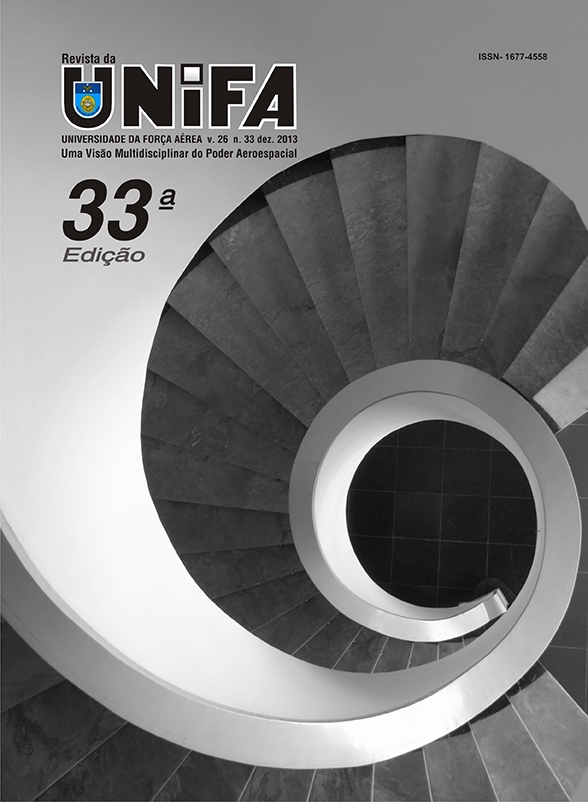Distance education at the Brazilian Air Force Officers Enhancement Course
the impact of an experiment
DOI:
https://doi.org/10.22480/revunifa.2013.26.585Keywords:
Distance education, Brazilian Air Force, Constructivist Theory, Officers Enhancement CourseAbstract
The research aimed to analyse how the use of Distance Education (DE) at the Brazilian Air Force Enhancement Course, offered by the Brazilian Air Force Enhancement School, affected the performance of those students that took the course using this educational modality between 1990 and 1998. The Distance Education implementation at the Brazilian Air Force is being introduced in a historical context. The Constructivist Theory is discussed as a base for teaching and learning collaborative communities. These communities are used at the DE systems in order to achieve efficiency and the significance of time and space factors are also analysed within this process. The research methodology was distinguished by an exploratory ex-post-facto study, following the hypotheticaldeductive method, mainly using qualitative data with quantitative contribution. The DE students performance was compared with the accomplishment of the traditional ones and as a result it was noticeable that DE students had an inferior performance than the traditional ones. Possible causes have been sought out through questionnaires
with students from the DE group. From the gathered information, it was possible to identify the probable causes and confront them with the theoretical framework used. The research revealed that the following aspects were the main reasons to justify the DE students inferior performance at the course: lack of time, in order to effectively devote themselves to the DE course and the lack of teaching and learning collaborative communities that could promote integration and improvement to the Distance Education process.
References
BARCIA, R. M. Universidade Virtual. Brasília: MEC/INEP, 1996.
COCHRAN, W. G. Técnicas de amostragem. Tradução de Fernando A. Moreira Barbosa. Rio de Janeiro: Aliança para o Progresso, 1965.
JONASSEM, D. O uso das novas tecnologias na educação a distância e a aprendizagem construtivista. Revista Em Aberto, Brasília, ano 16. n. 70, p. 70-88, abr./jun. 1996.
LÉVY, P. Cibercultura. São Paulo: Editora 34, 1999.
NEDER, M. L. Avaliação na Educação a distância: significações para definição de percursos. Cuiabá: NEAD / UFMT, 1996.
PALLOFF, R. M.; PRATT, K. Construindo Comunidade de Aprendizagem no Ciberespaço – Estratégias eficientes para salas de aula on line. Porto Alegre: Artmed, 2002.
PASSOS, L. A. Aguaçu na Dança do Tempo e a Educação da Escola. Cuiabá: UFMT, 1999.
PIAGET, J. Aprendizagem e conhecimento. Rio de Janeiro: Freitas Bastos, 1975.
PRETI, O. Autonomia do Aprendiz na Educação a distância. In: ______. Educação a distância: construindo significados. Brasília: Plano, 2000.
RIBEIRO, G. S. N. Webquest: protótipo de um ambiente de aprendizagem colaborativa a distância empregando a internet. Brasília: UnB, 2000.
RODRIGUES, R. S. Modelos de Educação a distância. In: PRETI, O. (Org.). Educação a distância: construindo significados. Brasília: Plano, 2000.
SHAFFER, C.; ANUNDSEN, K. Creating Community Anywhere. New York: Jeremy P. Tarcher/Perigee Books, 1993.
TODOROV, J. C. A Importância da Educação a distância. Brasília: INED, 1994.
Downloads
Published
Issue
Section
License
Copyright (c) 2013 Francisco Vieira Garonce

This work is licensed under a Creative Commons Attribution-NonCommercial 4.0 International License.
Revista da UNIFA permite que o (s) autor (es) mantenha(m) seus direitos autorais sem restrições. Atribuição-NãoComercial 4.0 Internacional (CC BY-NC 4.0) - Revista da UNIFA é regida pela licença CC-BY-NC









